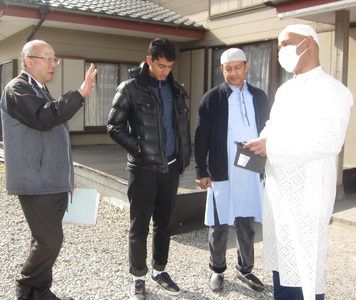(AhlulBayt News Agency) - Since late September, about a dozen Muslims who are regular visitors to a mosque in Chiba’s Inage Ward, east of Tokyo, began patrolling the area once or twice a month, hoping their contribution to local security would help boost mutual understanding with Japanese residents.
Sultan Mahmud, a 49-year-old Bangladeshi who heads the mosque, said the activity is already beginning to bear fruit. “Since we started patrolling the area, the Japanese news media covered us and local university students visited the mosque to learn about our religion,” he said. “We are getting along better with our neighbors too.”
The Chiba Mosque, established in 2010, has been a crucial worshipping space for local Muslims, attracting about 50 to 60 people for Friday prayers. But some attendees are wary that they had been viewed with suspicion and prejudice by local residents.
Some years ago, a neighbor repeatedly threw stones at the mosque and abused attendees with insults during prayers, said Mahmud. Residents, for their part, said they used to feel uneasy when many unknown foreigners gathered in the area.
The mosque attendees thought it is important to reach out to the community and build relationships with locals since a lack of interaction with them may have led to misunderstanding and conflict.
About 200,000 Muslims are estimated to reside in Japan, with around 80 established mosques, according to the Japan Halal Business Association. But being accepted into local communities has been a common challenge for many.
Some fear that they could easily be branded terrorist sympathizers amid inflammatory global rhetoric targeting Muslims, including U.S. President Donald Trump’s recent executive order that attempted to ban entry of people from seven Muslim-majority countries. Violent attacks plotted by terrorists in the name of radical Islam also exacerbate alienation for Japan-based Muslims.
In Japan, a 2010 internal police data leak showed Muslims were targeted for blanket surveillance by police and many, including those who helped authorities in investigations into international terrorism, found their personal information had been collected.
“When one person with links to Islam launches a terrorist attack, all Muslims are considered bad people, but that is not true. In Islam, killing or insulting people is strictly forbidden,” Mahmud said, adding “We wanted our neighbors to understand us better and foster friendships.”
When Chiba mosque attendees consulted with a local police station in summer, they were advised to contribute to the community through patrol activities together with a local neighborhood association.
Yasuyuki Orinami, the chief of the security section at Chiba-Kita Police Station, who connected the mosque-goers with local residents and neighbors said, “Many mosque attendees joined not just in the patrolling activities but also local community events including fire-extinguishing drills, mochi tsuki (rice cake pounding) and flower planting with Japanese neighbors.”
“I have already seen a very positive impact. I see that they are now being able to communicate at a deeper level with locals. We want to continue this process steadily,” he said during his recent visit to the mosque to inform Mahmud of more anti-crime events in the area.
The group of Muslims often patrols with a neighborhood association and police officers on Sunday evenings. They wear green hats with the “anti-crime” logo and hold flags with crime-prevention messages during about an hourlong stroll.
Participants monitor for any people deemed to be acting suspiciously and keep an eye on pedestrians to prevent traffic accidents, Mahmud said.
Md Nasirul Hakim, a 48-year-old Bangladeshi, said, “It was fun” to join the patrol activity. He hopes local people will better understand Muslims by seeing them protecting the area.
“I want people to know that some negative images shown in the media are not the real picture of Islam. Islam’s core value is peace. I hope people will judge us after understanding more about our religion.”
Japanese participants also welcome the foreigners’ involvement and some have begun to change their views toward Muslims, according to Taiji Tsuchihashi of the Nishimachi neighborhood association. “Residents began to talk with Muslim neighbors and greet them as they see each other when taking garbage bags outside,” he said.
“In the past, I heard some neighbors saying mosque attendees looked scary. But once I spoke with them and got acquainted with them during patrols, such an image turned out to be wrong,” said Tsuchihashi, who himself often leads community patrols.
“We want to invite them to more and more events in the community,” he said, adding the only problem is adjusting their schedule so that any activity would not overlap with the participants’ prayer timings.
“For now, Muslim participants are mainly interacting with executives of the neighborhood association but we hope a broader range of residents can become involved with them in the future,” he said.
Kumiko Yagi, professor of Islamic studies at Tokyo University of Foreign Studies, said, “Prejudicial views come from ignorance which leads to fears without any reason,” so getting to know Muslim people in person could help eradicate distorted views.
“If there are more opportunities for ordinary Japanese to meet with Muslims in person, the possibility of eradicating prejudice would be higher,” she added.
“The patrol provided us with a very good opportunity to get to know our neighbors. We understood that we could build relations with them while helping each other. We want to keep interacting with local people to further foster our friendship,” Mahmud said.
/298
source : Japan Today
Tuesday
28 February 2017
8:44:33 AM
814660

A group of Muslims in Japan has launched a community outreach program as part of efforts to bridge the gap with locals and counter the perception that links Islam with terrorism.
